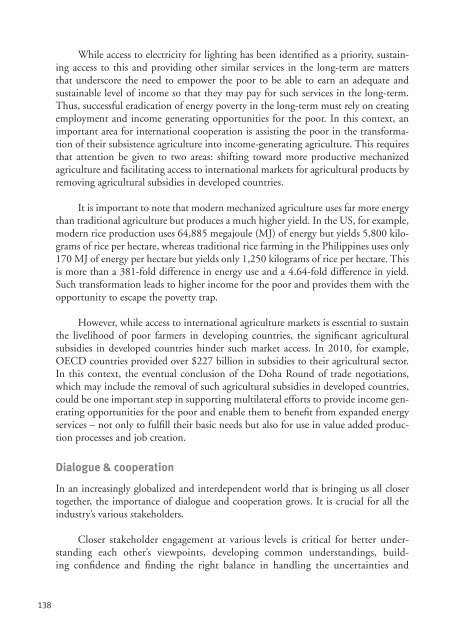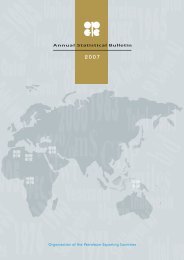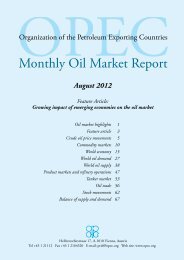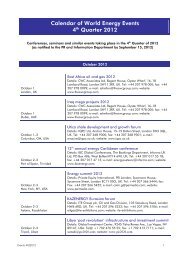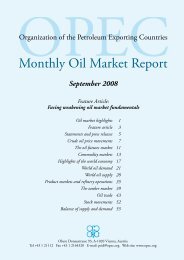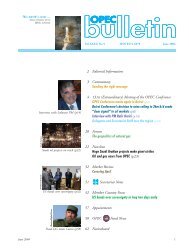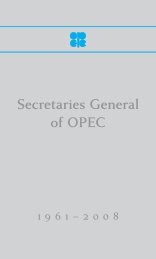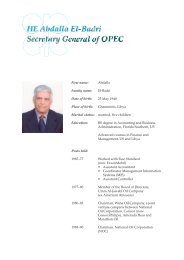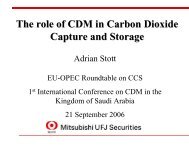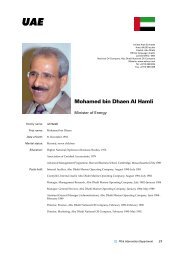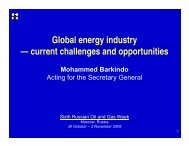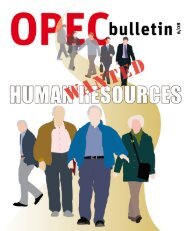World Oil Outlook - Opec
World Oil Outlook - Opec
World Oil Outlook - Opec
- TAGS
- world
- outlook
- opec
- www.opec.org
You also want an ePaper? Increase the reach of your titles
YUMPU automatically turns print PDFs into web optimized ePapers that Google loves.
138<br />
While access to electricity for lighting has been identified as a priority, sustaining<br />
access to this and providing other similar services in the long-term are matters<br />
that underscore the need to empower the poor to be able to earn an adequate and<br />
sustainable level of income so that they may pay for such services in the long-term.<br />
Thus, successful eradication of energy poverty in the long-term must rely on creating<br />
employment and income generating opportunities for the poor. In this context, an<br />
important area for international cooperation is assisting the poor in the transformation<br />
of their subsistence agriculture into income-generating agriculture. This requires<br />
that attention be given to two areas: shifting toward more productive mechanized<br />
agriculture and facilitating access to international markets for agricultural products by<br />
removing agricultural subsidies in developed countries.<br />
It is important to note that modern mechanized agriculture uses far more energy<br />
than traditional agriculture but produces a much higher yield. In the US, for example,<br />
modern rice production uses 64,885 megajoule (MJ) of energy but yields 5,800 kilograms<br />
of rice per hectare, whereas traditional rice farming in the Philippines uses only<br />
170 MJ of energy per hectare but yields only 1,250 kilograms of rice per hectare. This<br />
is more than a 381-fold difference in energy use and a 4.64-fold difference in yield.<br />
Such transformation leads to higher income for the poor and provides them with the<br />
opportunity to escape the poverty trap.<br />
However, while access to international agriculture markets is essential to sustain<br />
the livelihood of poor farmers in developing countries, the significant agricultural<br />
subsidies in developed countries hinder such market access. In 2010, for example,<br />
OECD countries provided over $227 billion in subsidies to their agricultural sector.<br />
In this context, the eventual conclusion of the Doha Round of trade negotiations,<br />
which may include the removal of such agricultural subsidies in developed countries,<br />
could be one important step in supporting multilateral efforts to provide income generating<br />
opportunities for the poor and enable them to benefit from expanded energy<br />
services – not only to fulfill their basic needs but also for use in value added production<br />
processes and job creation.<br />
Dialogue & cooperation<br />
In an increasingly globalized and interdependent world that is bringing us all closer<br />
together, the importance of dialogue and cooperation grows. It is crucial for all the<br />
industry’s various stakeholders.<br />
Closer stakeholder engagement at various levels is critical for better understanding<br />
each other’s viewpoints, developing common understandings, building<br />
confidence and finding the right balance in handling the uncertainties and


